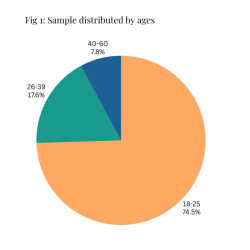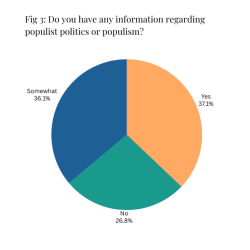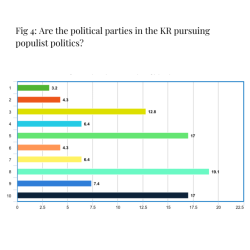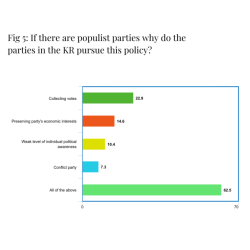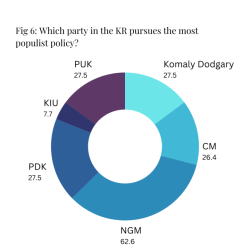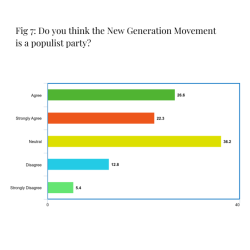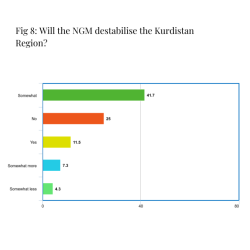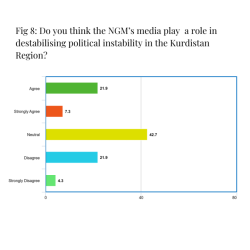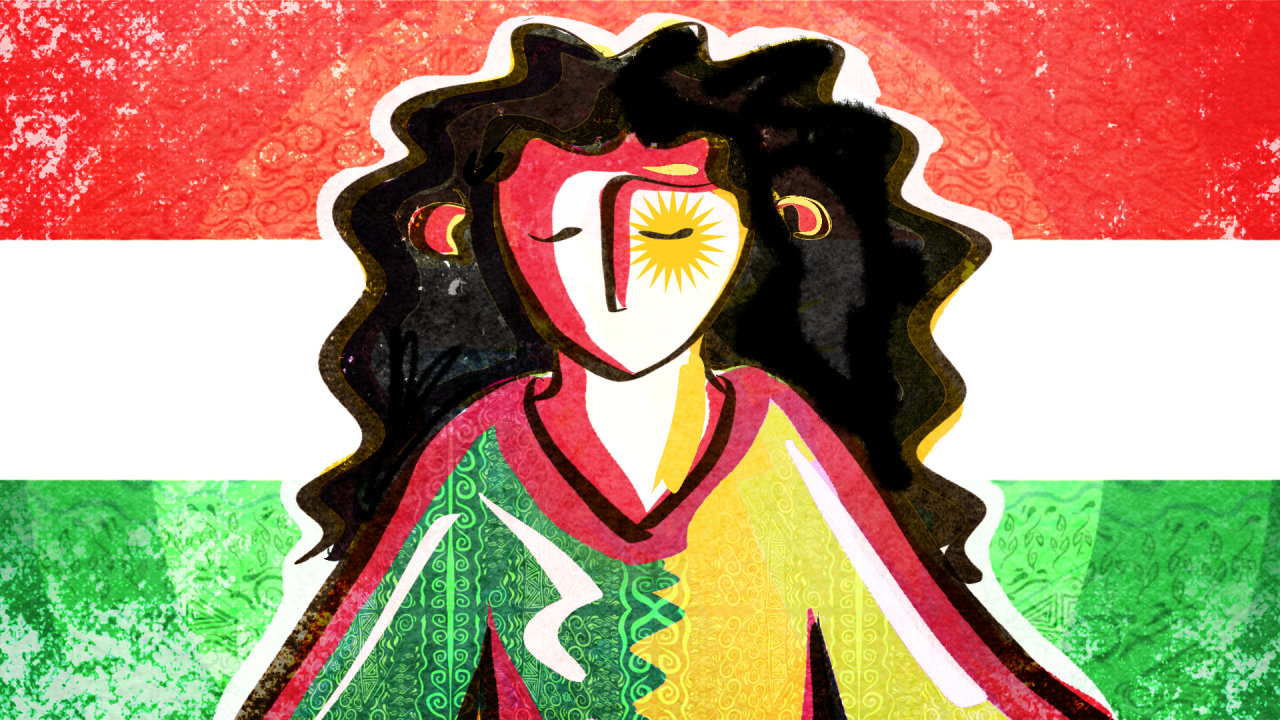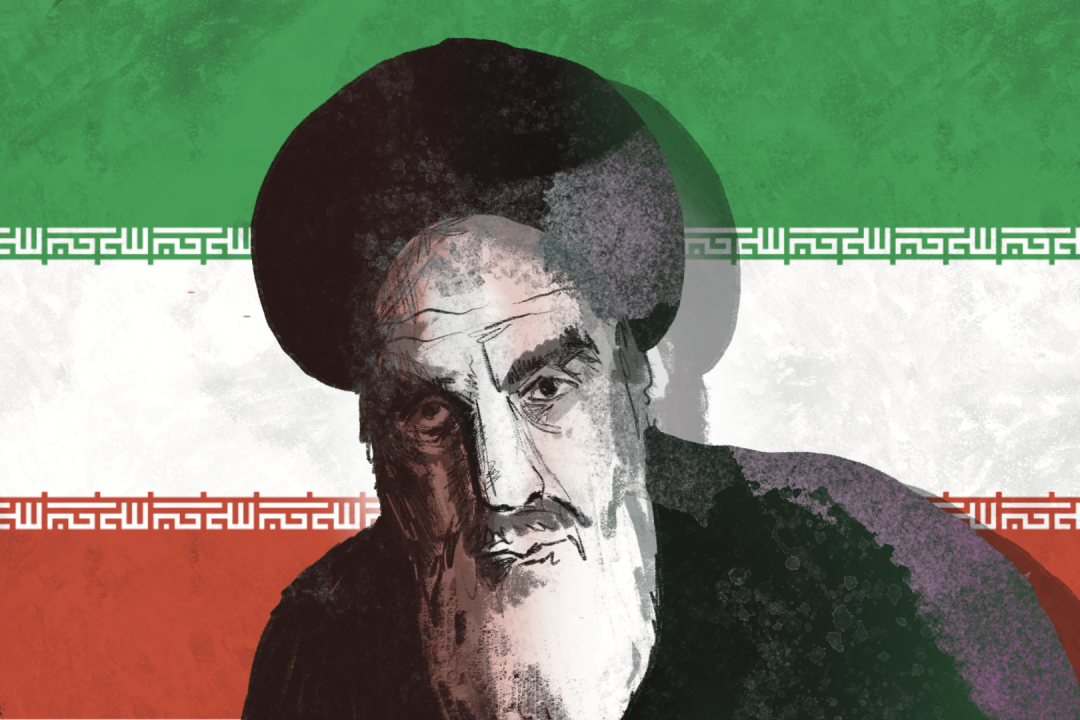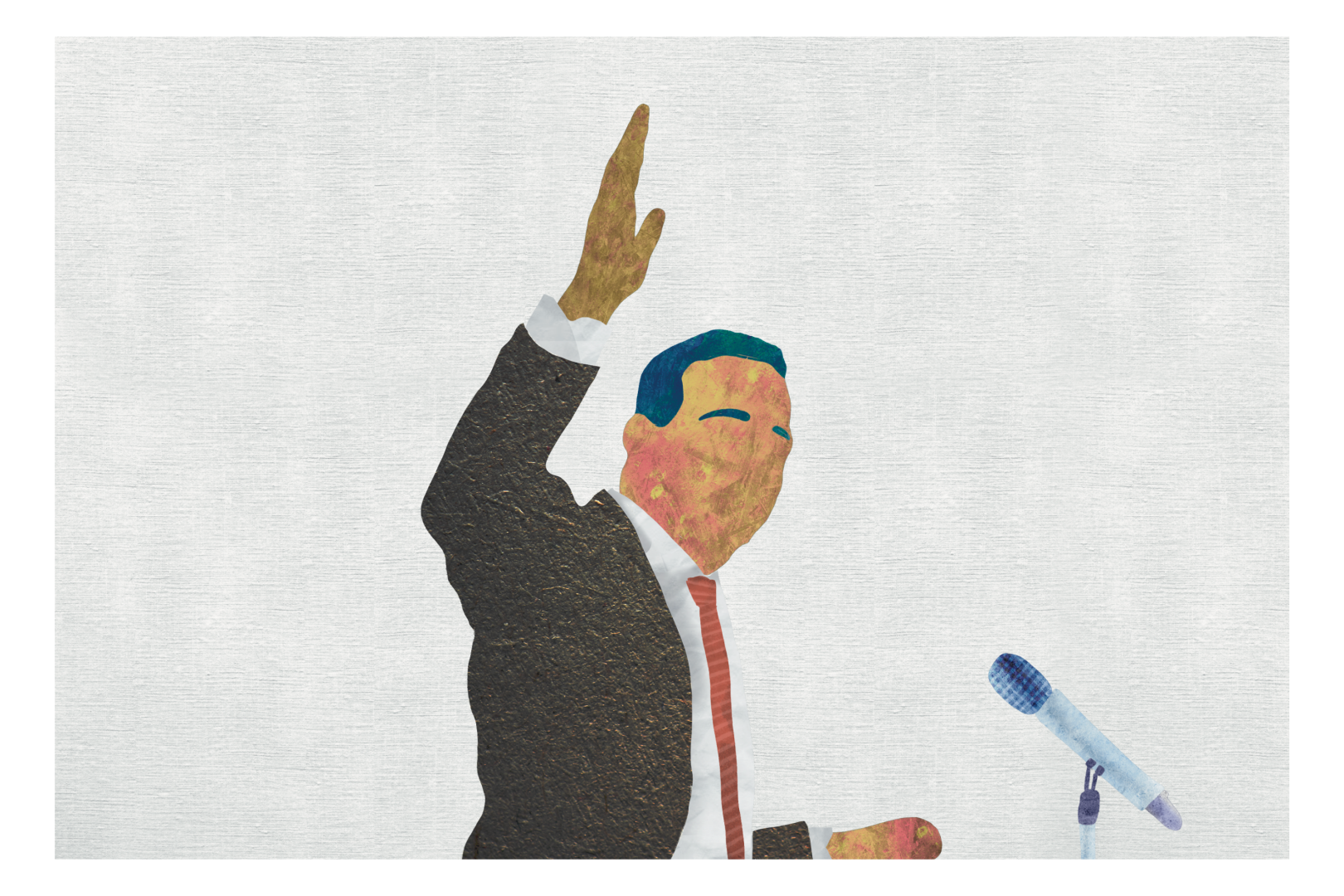
Populist Politics and Its Effect on Internal Stability in Kurdistan Region
Introduction:
Populism is a modern phenomenon that focuses on everything people are concerned about. The rise of populism encourages people to stand against the government. It is what stands against the establishment, it stands against political parties (Markus, 2018). Populism is one of the key political words of the twenty-first century, it is a political belief that a small or elite minority subverts and takes advantage of the disadvantaged, hard-working majority. Populist politicians seek to unify the population against a shared foe while claiming to defend the interests of ordinary or working-class citizens. The phrase is also used to describe right-wing challenger parties in Europe, left-wing presidential candidates in the United States (US), and left-wing presidents in Latin America. However, its broad usage creates misunderstanding and dissatisfaction.
This research provides a significant grounded analysis of populist politics and its consequences on internal stability in the Kurdistan Region. By examining and investigating a case study regarding the NGM as a populist party in KR. The New Generation Movement is a populist and bourgeois movement that established its political position on the demands of the people emotionally (Hamanury, 2022). This study consists of two chapters; the first chapter involves a historical background to the main concept and also explains some active populist parties in Italy and Hungary. The second chapter provides the main findings.
Research Objectives and Importance
This research analyses a contemporary phenomenon with internal stability in KR. It involves the effectiveness of a populist party such as the NGM on the internal stability of the region. Therefore, it provides a brand new finding related to the core question of the study through fieldwork. On the other hand, this research is important because it is difficult to find such research and data elsewhere, especially in the KR.
The KR has been established as a semi-independent region for nearly three decades and until 2005 it was a two-administration system. With the rise of the Change Movement (CM) in 2009, a good opportunity occurred for political parties and the opposition to play a role. The NGM was able to take advantage of these opportunities.
Research Questions
The main question of this research is: How do populist politics affect internal stability in KR? The paper also established a sub-question: What makes the NGM populist?
Research Hypothesis
The hypothesis states predictions about what the research will find. It is a tentative answer to your research question that has not yet been tested. The hypothesis of this research is; that populism will lead to political instability. Certainly, a hypothesis is not just a guess, but it is based on existing theories and knowledge.
Methodology
This research used mixed methods which are qualitative and quantitative, the utilization of the quantitative method has been prioritized over the qualitative method. It collects data through interviews and surveys. This research has conducted four structured interviews. One of them is in person and the rest is by a call in Erbil, from January 2023 to March 2023. The research also conducted a survey that one hundred questionnaires administered across Erbil by fieldwork and online form, between January and February 2023. This paper utilizes secondary data as well, such as books, academic articles, previous research, websites, and videos. YouTube videos would be beneficial when it comes to populism because through the media you can hear and see different lenses related to the subject, that the reader might never read in a book. Regarding research design, this study emphasizes case study design to provide an in-depth and comprehensive analysis of one particular case or event. In this context, there is one prominent populist political party in KR which is NGM.
The term ‘case’ is most commonly used to connect the case study with a specific location, such as a community or organization. The emphasis is mainly on a thorough examination of the environment (Bryman, 2012, p. 66). The basic case study entails a single case’s detailed and intensive analysis. Therefore, a case study is beneficial for two major reasons; first, the case needs to be studied comprehensively and get the details. Also, a case study will offer this opportunity so that nothing gets ignored when using the case study method for collecting information. Second, a case study is important to save time it is not expensive, costly, or time-consuming. The nature of this research, is a mixed method between descriptive and explanatory, to describe how such policy affects the internal stability of a country or an autonomous region.
Limitations
Despite all the advantages of a case study, it has some limitations. Firstly, a case study cannot be representative and generalizable. It cannot tell about other cases and it may be biased at some point (Bryman, 2012, p.67). Another limitation of this research was the difficulty in finding relevant sources and secondary data related to the topic in the literature, especially in the KR. If anyone seeks the concept of populism itself dozens of sources let the reader know about populism, but there is not much about populism in literature as a factor in destabilizing a country. Even in the work of many authors who wrote about populism such as Benjamin Moffitt and Simon Tormey, Cas Mudde, and Luke March. The literature review section has proved that. As this study mentioned earlier, the reader would not be able to find such research in KR. In addition, these limitations do not let the literature review section build its structure and identify themes and debates. Another limitation in writing this paper was the inability to access some sources. The biggest limitation of the survey was that during the process there were many people were not ready to respond to the survey.
Literature Review
In the literature review section, this study looks into the current knowledge, and relevant sources, as well as identifies the research gap. Different contributors have defined populism as an ideology, movement, strategy, logic, and discourse. Despite its common use and variety of semantics, it has been discussed by a great number of authors in the literature that populism has one thing in common. That is the idea of virtuous people versus the corrupt elite (Smith, 2020). As has been previously reported in the literature, populist politics can affect the internal stability of countries, more frequently in democratic countries. Populism is often claimed to be a destabilizing element within democratic politics (Rosanvallon, 2008; Urbinati, 1998, p. 2). Some authors have also suggested that populism thrives on instability having to address the problem of stability. While there has been much research on populism around the world, populism, and liberal democracy, left and right-wing populism. But very little research on populism with internal stability, or populist politics as the reason for instability, particularly in KR. In this light, no previous research has investigated this problem before.
Previous studies have also shown that populism exists in different world regions. There is a specter of populism haunting the world (Ionescu & Gellner, 1969, p. 46). Populism has its elements and characteristics in every society. Thus, is quite a distinct phenomenon. Populism has three major approaches. The ideational approach has virtually always played a role in populism research. Some authors such as Moffitt and Tormey have driven the further development of a new model of populism which is ‘political style’ on an inductive basis, that promises a new perspective on populism that helps to solve several issues about the existing literature (Moffitt & Tormey, 2013, p. 1). However, this approach remains briefly addressed in the literature. As this research has mentioned earlier, populism as the result of destroying internal stability has not been examined elsewhere. The key question that this research attempts to answer is still not discussed in the literature.
This is the gap that this research attempts to fill.
Theoretical Framework
This section defines and evaluates the key concepts and theories that have been applied in this study. The key concepts are populism and instability. This section also indicates the typologies and characteristics of populism which later analyze the case study based on these two. Regarding internal instability, Ahu Coskun Ozer defined instability as the unstable structure of a government and its inclination to collapse in a short time due to unstable political structures (Ozer, 2021, p. 33). Political instability is a natural tendency of a government to collapse either because of conflicts or growing struggles, sometimes violent, between various political parties. Political instability also occurs if there is a rapid change in a government and policy, increasing the likelihood of subsequent instability (Global Strategies, 2022).
It is difficult to clearly define populism for several reasons. First, the term populism is used by the media, academics, and politicians differently, and even in the same circles the term populism is used differently (Mudde & Kaltwasser, 2012, p. 17). Second, the concept of populism is vague or not clear. Some scholars have defined populism as a type of political discourse, ideology, leadership, movement, phenomenon, strategy, style, or syndrome. Mudde and Kaltwasser have given a comprehensible definition of populism. “Populism is a thin-centered ideology that considers society to be ultimately separated into two homogeneous and antagonistic camps, ‘the pure people’ versus ‘the corrupt elite’ and which argues that politics should be an expression of the volonté générale (general will) of the people” (Mudde & Kaltwasser, 2017, p. 6).
Although populism is a highly diverse political phenomenon, meanwhile, all populists have a common discourse. Left or right, conservative or progressive, religious or secular are all conceivable ideologies for populist actors. Jan-Werner Müller in his book What is Populism? Defines populism as an understanding of politics that divides society into two completely different parts. One part of society is morally pure, this part is united because they have a common concern, while the other part of society is the political and economic elites that are completely corrupt, and all their policies and behaviors are against the interests of the pure people. Populists claim that only they represent the people, while others are on the anti-people front (Müller, 2016, p. 10).
The Ideational Approach of Populism
Populism has been characterized in a variety of ways and takes different shapes. The ideational approach has always been a part of the study of populism. This research has chosen the ideational approach for its theoretical framework. Because the ideational approach defines the term well enough in comparison to the PoliticalStrategic Approach or Socio-Cultural Approach. On the other hand, this approach is the most broadly used in the field. Despite this, the ideational approach is broad and can potentially apply to all political movements and parties. The ideational approach has three core concepts: the people, the elite, and the general will.
The ambiguity of the word people is at the center of much of the discussion around the phenomenon of populism. The majority of individuals believe that ‘the people’ is a construction that refers to a particular understanding of reality (Mudde, 2017, p. 9). While others have sought out more precise substitutes like the heartland. Mostly the term ‘people’ is used in a combination of three meanings, the people as sovereign, as the common people, and as the nation. The idea of the people as sovereign is founded on the modern democratic concept, which defines the people as the rulers, as well as the ultimate source of populism in politics. This idea is related to the French and American Revolutions, which established a ‘government of the people, by the people, for the people’ in the words of US President Abraham Lincoln (muddy, 2017, p. 9)
The second meaning is the idea of ‘the common people’ referring to a broader class category that combines socioeconomic position with particular cultural traditions and mainstream beliefs. The third meaning is the notion of the people as the nation, which refers to a national community, defined either in civic or ethnic terms. Several scholars have proposed theories on what ‘the elite’ means in populism. The elite is defined based on power, it includes most people who hold leading positions in politics, the economy, and the media (Mudde, 2017, p. 12). The last core concept in populist ideology is the idea of the general will, which relates to the ability of the people to form a community and create legislation to uphold their common interests. The assumption that there is a public will is strengthened by the distinction between the pure people and the corrupt elite.
Characteristics of Populism
Beyme argues that populists can be characterized by a set of assumptions. Populists define themselves as a political movement that opposes the political elite. Leaders and organizations of populism claim to be the forces that will take action according to the will of the people and govern as the people want. The second assumption regarding populist movements is that these groups do not have an elaborate agenda because most of these groups were founded around a single, overarching concern, which is typically connected to some form of marginalization. The third assumption holds that populist groups employ propaganda to spread their ideology. In addition, Populist groups not only tend to engage in propaganda but also utilize conspiracy theories to position themselves. The last assumption about populist parties is that populists tend to use radical ideologies, particularly right-wing populists (Beyme, 2017).
Chapter One: Populist Movements
History of Populism
The term populism has been around since ancient Rome and has its roots in the Latin word ‘Populus’ meaning the people. But since then, populism has been used to describe dozens of political movements. The first use of the term populism comes from nineteenth-century political movements on both sides of the Atlantic. Throughout history, populist ideas have often coincided with charismatic demagogues, as these personality types are often successful at galvanizing the masses. One of the earliest populists was Julius Caesar, who undermined Rome’s ruling aristocrats by appealing to the underrepresented working class (Suzdaltsev, 2016).
The modern history of democratic legitimacy provides further information on the first use of the term. Throughout the development of contemporary democracy, the people have also shown themselves to be a cohesive force capable of acting and overthrowing the power of government officials. The earliest movements that may be considered populist in the nineteenth century would have originated from the notion that the people can authoritatively retrieve authority from the government to people and restructure institutions from corrupt elites (Kaltwasser et al., 2017, p. 17). The US had one of the oldest populist movements The People’s Party from 1891 to 1892. It was a movement based in the south and west that was hostile to Washington’s political elite as well as the railroad and banking industries.
The term populism has also been used to describe the Russian movement of ‘going to the people’ under the Narodniki which was a group of idealistic, revolutionary students from the cities who aimed to influence the people in the countryside to overthrow the tsarist state during the tumultuous years between 1860s and early 1870s. The emergence of populism in Latin America can be dated to the beginning of the twentieth century, in particular with the rise of Hipolito Yrigoyen in Argentina and Arturo Alessandri in Chile. Populism is frequently used negatively in the twenty-first century. Modern populist movements have rebelled against monarchies, monopolies, and many other strong institutions (Kaltwasser et al., 2017, p. 19).
Populist Movements
In the twenty-first century, populist parties are almost everywhere. Populism has been most relevant in four geographical areas, in both the North and Latin American continents, along with Europe to the Asia continent. For further understanding of this phenomenon and how it works in society, it would be significant to cover populist movements and parties in some places where these parties are more active which affected the status of democracy and internal stability, such as Italy, Hungary, and KR. With some of the issues that those parties focus on.
Populism in Italy
Populist parties in Europe exist as insurgents, as government, and as left- and right-wing parties. It typically relates to xenophobia and anti-immigration. Populism in Italy is not a recent phenomenon, rather, it has a long history in the country’s political landscape. Different populist parties and leaders have succeeded in Italy by appealing to the people and defeating the country’s traditional political, social, economic, and cultural elites. Populism in Italy is represented by The Five Star Movement (5SM) by Beppe Grillo, the Lega Nord of Matteo Salvini, and Brothers of Italy by Giorgia Meloni (VICE, 2021). The 5SM and the far-right League formed a grand coalition to hold the Italian Parliamentary majority. M5S does not define itself as right-wing or left-wing, it formed as an alternative to Italy’s mainstream political parties.
Its anti-establishment platform and uncompromising demand for a clean government have generated support from across the political spectrum, it was viewed as a protest party as it initially made gains in local and regional elections. 5SM is Eurosceptic, despite calling for a non-binding referendum on whether Italy should abandon the euro, it has stopped short of pushing for a vote on EU membership. Another rule of the 5SM is ‘zero cost politics’ it prohibits those who are elected twice from running again, based on the belief that no one should be in politics as a means to make money. The main challenge for 5SM is proving it can govern effectively (Zotto et al., 2017).
Italy’s Lega Nord can perhaps lay claim to the greatest political success. The party has been in government three times and has held several key ministers in the coalition government led by Silvio Berlusconi. It emphasizes tough limits on Immigration, greater northern autonomy, and characterizing Muslims and Islam as representing a fundamental threat to the values and cultural integrity of Italians. Salvini believes it is a matter of national security. Therefore, Lega Nord should be serious about Muslims in the country and the case of Immigration.
Brothers of Italy is another populist right-wing party with neo-fascist roots within the coalition run by Giorgia Meloni. She is the extreme right-wing leader since World War II and she is the first female Prime Minister. She describes herself as a mother, Italian, and Christian (DW News,2022). Georgia Malone promised to revive the country and put the interest of Italians first. The anti-immigration case is not solely the concern of those populist parties, but the people of Italy are also concerned about this. That is why the people supporting these parties, and believe populist parties can get rid of this crisis. Regarding this case, Meloni stated:
- Have you seen the pictures of Ukrainian refugees, women, and children who are fleeing the war? Don’t those images seem strange compared to the images of boats full of grown men that we have seen arriving here in recent years?
- When people run away from a war you see women and children coming because the men are fighting but if just men are arriving, then they can only be running away from war, after leaving the women and children to fight. (Meloni, 2022).
Populist parties in Italy rely on the crisis that the country faces, to reach authority and reinforce their parties. Also using media and propaganda to shift people’s attention and generate the belief that only these parties can protect and accomplish the real interests of the people in Italy. Because the policy of the far-right coalition mostly concentrates on restricting migrants in Italy, this leads to violence and some sort of internal instability in the country. For example, in February 2018, Luca Traini, a twenty-eight-year-old Italian candidate in the Lega Nord party went on a two-hour shooting rampage through the city of Macerata. He just targeted people of African descent (Hume, 2021).
Populism in Hungary
With the fall of the Soviet Union, communist rule in Eastern Europe also came to an end, including Hungary, where a new democratic government was elected in 1989. The strongest party in Hungary after the 2010 election was Fidesz-KDNP (Alliance of Hungarian Solidarity) which is a right-wing populist national-conservative party, continued to grow over time and won an absolute majority in the 2014 legislative elections in Hungary, making populism a powerful force in the country. Populism earned a central role in Viktor Orban’s government (Szabo, 2019, p.5). The political promises of Fidesz during the 2010 elections centered on bringing change to the country, correcting the errors of liberal governments, and giving the interests of the Hungarian people prioritize business and private interests. Orban’s party has gained popular support, partly by offering large amounts of money to couples with more than two children. Some people in Hungary describe Orban as a charismatic leader, while others believe he changed everything, and everything became worse. By destroying press freedom and legal institutions (Mackenzie, 2019).
The Hungarian populist government started to undermine European principles. The immigration crisis of 2015 was a remarkable event in the relationship between the EU and Hungary. While the EU was attempting to approach the crisis from a humanitarian angle, the Hungarian government built a fence on the southern border of the country to increase its defense against illegal migration. Also, this was the time the first billboards appeared all over Hungary, claiming the EU plans to let migration flow to Hungary and to use the country to resolve the issues of Western European states caused by immigration (Georgiou & Zaborowski, 2017).
The Hungarian administration has been criticized for being anti-Semitic, violating European principles, and undermining Hungary’s democracy. On the other hand, the Hungarian government rejects these critiques and claims these are all part of the ‘Illiberal Democracy’ that is being constructed in the country. The media and European politicians characterized the illiberal democratic system as populist. Collectively, populists confront the elite, assert that they speak for the masses, and see themselves as morally superior to opposing viewpoints and political parties. This is shown in Hungary in a variety of ways, and Fidesz’s political culture is strongly influenced by this mindset. Fidesz represents the entire Hungarian government as the will of all Hungarians, whereas the EU is perceived as the elite. The EU criticized the government of Hungary for losing its democracy.
As BBC News reported Fidesz started to modify Hungary’s system in the party’s favor, by rewriting the constitutions, enshrining the party’s conservative agenda, adding references to Christianity, and moving to consolidate the party’s power. Moreover, the party organized a takeover of the judiciary, forcing older judges to retire from Hungary’s Supreme Court and replacing them with Fidesz loyalists. Fidesz banned public assembly and controlled broadcasting media. Meanwhile, the party started to insult the press. In this light, Hungary has become a non-democratic country because of the populist politics in the country (Mackenzie, 2019).
Populism in Kurdistan Region
This phenomenon does not have a long history in KR, it occurred in 2009 with the establishment of the CM by Nawshirwan Mustafa, as a political movement and presented itself in the guise of opposition. In this light, the NGM and Shaswar Abdulwahid consider the second populist movement in KR. The emergence of the NGM goes back to the ‘No Now Movement’ which took a serious stance against the 2017 referendum. NGM has taken advantage of the political vacuum in Kurdistan due to the weaknesses of other political parties (Hamanury, 2022).
The NGM in 2023 is the first opposition party in the region with a strategy plan for a developed Kurdistan based on short and long-term. In the fifteen-year plan article, they stated, that the KR needs to undertake a brave new change, unafraid to take on the large and complicated problems that require constructive dialogue with the Iraqi government. The NGM can resolve the issues between Erbil and Baghdad and make the Iraqi Constitution for our citizens. The NGM seeks to form a majority government capable of implementing a cohesive, progressive policy agenda to end that practice. The NGM stated that political stability and peace lead to economic development. It is an issue of primary importance for the NGM because, without a strong economy, it cannot realize the true potential of the KR (Abdulwaheed, 2018, p. 2).
Chapter Two: Results and Discussion
Survey
One hundred questionnaires were administered across Erbil by fieldwork and online form, between January and February 2023. The main rationale for the selection of this location was the fieldwork. The survey did not choose a particular community, but most of the respondents were young people (76.2 percent) between eighteen to twenty-five years old. The age of twenty-six to thirty-nine is about (18.4 percent) and the age of forty to sixty is (8.2 percent), (see Figure 1).
Figure 1: Sample distributed by ages
Men constituted (57.3%), while women formed (42.7%) (see Figure 2).
Figure 2: Sample distributed by gender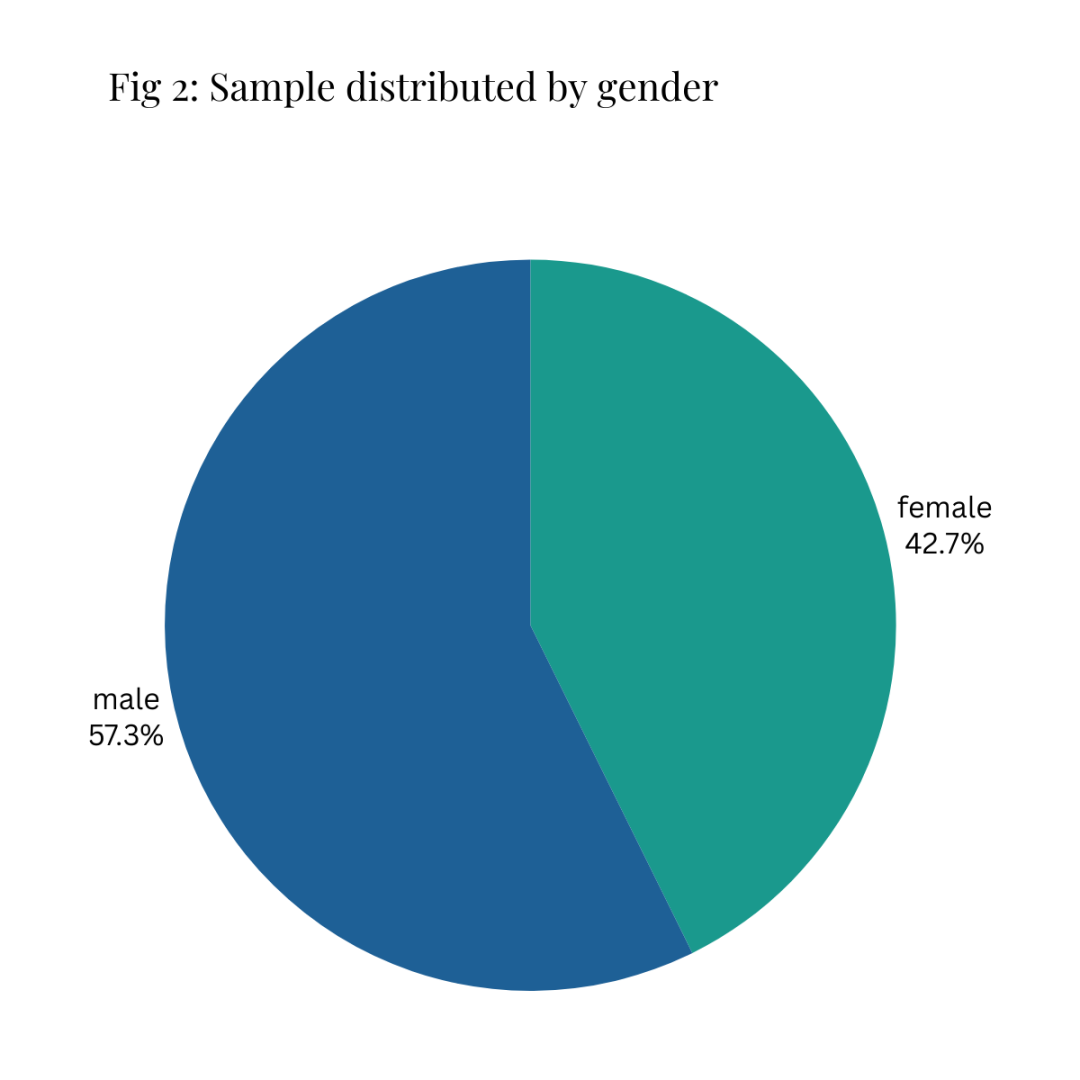
Survey respondents were asked do they had information about populist politics or populism (37.1%) of respondents replied yes, (36.1%) said somewhat, and (26.8%) replied no, this means solely minimum number of respondents did not know anything about populism (see Figure 3).
Figure 3: Do you have any information regarding populist politics or populism?
The survey measured one of its questions from zero to ten, how frequently the political parties in the KR pursue populist politics. Therefore, (71.2%) of the votes are over number five which means most of the respondents believe that the parties in the KR engage in populist politics (see Figure 4).
Figure 4: Are the political parties in the KR pursuing populist politics?
If there is populist politics, why do the parties in the KR follow this policy, whether it is for collecting votes or preserving the party’s economic interests, (62.5%) replied to all of them (see Figure 5).
Figure 5: If there is populist politics why do the parties in the KR pursue this policy?
The survey asked which party in the KR follows the most populist policy (62.6%) of the respondents replied the NGM is the more populist party in the KR than the other parties such as PUK, PDK, and CM. Respondents have said the PDK is the second most populist party by (34.1%) after the NGM (see Figure 6).
Figure 6: Which party in the Kurdistan Region pursues the most populist policy?
Regarding the question of whether the NGM is a populist party or not, (26.6%) are agree (22.3%) strongly agree. (36.2%) are neutral and (12.8%) are disagree (see Figure 7).
Figure 7: Do you think the New Generation Movement is a populist party?
Regarding the main question of this research, will the NGM destabilize the KR? The survey illustrated that solely (11.5%) of respondents replied yes, (25%) replied no, and (41.7%) replied somewhat (see Figure 8).
Figure 8: Will the New Generation Movement destabilize the Kurdistan Region?
The last question of the survey is; does the NGM’s media play a role in destabilizing the political instability in the KR? There is the result, (21.9%) of respondents agree. Meanwhile, the survey conveys the same percentage of disagreeing which is (21.9%). And (42.7%) of the respondents stay neutral (see Figure 9).
Figure 9: Do you think the New Generation Movement’s media plays a role in destabilizing political instability in the Kurdistan Region?
Discussion
The results indicate that populist politics and NGM are unable to undermine internal stability in KR. Figure 8 in the survey illustrated that 25% of the respondents replied, that the NGM does not affect the internal stability of the region. Although, 41.7% replied somewhat meaning they are not sure how the NGM can affect the stability of the region. The particular reason for the circumstance is that their regional activities have prevented them from disrupting political stability in the KR. The NGM and its leader frequently announce that the KRG is not legit and failed to run the government, even in the speech of Shaswar Abdulwahid you can see how they delegitimize the KRG, and motivate people to not trust the government. In the line of the hypothesis, the result might suggest that NGM would lead to political instability, but based on the findings a more plausible result is that it will not lead to political instability.
“The NGM as the largest opposition party in the region, cannot disrupt internal stability, but it can create an opinion through the media that threatens the individuals in power” (Anonymous, personal communication, 12 Feb, 2023). This could be interpreted as a contradiction between the hypothesis and the main findings of this research. While previous research focused on populism as a destabilizing element within democratic countries and some have also suggested that populism thrives on instability. These results demonstrate that populist parties and movements differ from one another, from country to country. In other words, if populism leads to internal instability in a country or affects the democratic elements, along the lines of the Fidesz party in Hungary has destabilized democratic elements in the country. This is true, but in the case of KR, the NGM will not be able to go in the exact direction or thrive on instability.
The generalizability of the results is limited mostly by the time and contributors to the result, and due to the lack of previous data on the subject, the result cannot confirm the reliability.
The effect of populist politics in KR
According to the findings, populist politics and NGM would not be able to destabilize internal stability in KR. “The NGM has not been able to disrupt political stability in the KR because its activities are more local” (Z. Rasul, personal communication, 29 Jan 2023). Nevertheless, People are more willing to rebel against the government as populism grows, because their activities and media coverage encourage people to confront the government. However, some experts believe that the NGM as a populist party does not influence internal stability directly but it can threaten the national values of the region. The national values refer to the level of patriotism of the people and if a threat or war occurred they do not tend to fight back. “Populists simplify everything and national values would be under threat” (Anonyms, personal communication, 25 Jan, 2023). which means they can affect political stability indirectly, indirectly it means cooperation with outside powers as Jalal Ahmad stressed. “If the NGM tries to cooperate with the forces outside the region to obtain power inside, they would affect internal stability” (J. Ahmad, personal communication, 3 Mar 2023).
Regarding the sub-question of this study, it is clear that the NGM constitutes a populist party because the characteristics of populism can be seen in the NGM such as taking action according to the will of the people. “Most of the political parties in the KR follow populist discourse, the NGM came out with a populist discourse in 2017” (Z. Rasul, personal communication, 29 Jan, 2023). Moreover, the additional approach of populism applies and corroborates here, when the NGM and its leader Shaswar Abdulwahid frequently try to behave and take action according to the will of the people. In other words, provide those things that the people need to demonstrate that they are the only party that can stand by the people and do everything in favor of the people. For instance, Shaswar Abdulwahid published a video on his Facebook account and stated:
Anyone who wants to make a deposit, if a citizen or an employee wants to pay taxes or deposit for water or electricity. Be patient with this government, we will cancel all the decisions of the KRG in the next few months. tax increases in assets and employees, all of which would be declined after the elections. Therefore, whoever believes will get an advantage, and those who do not, keep depositing to the government I have nothing to do with it. But be sure, this cabinet of government, would no longer be there. (Abdulwahid, 2023) The NGM activities are through supplying goods, oil, and water. Especially water to those neighborhoods were short of water. The party and Shaswar Abdulwahid also tried to restore roads and tunnels to show that the NGM would be the best party in the KR if they ran the government. For instance, in February 2023 the NGM decided to restore the Smaquly road (NRT News, 2023).
Conclusions
This study has focused on the role of the NGM as a populist party and its effect on internal stability in KR. The research has investigated and reached a logical conclusion that the NGM is a populist party, the particular reason for circumstance is that the characteristics of populism can be seen in the attitude of the NGM and critical examples have been given of why this is the case. The NGM has encouraged people to stand against the government but cannot destabilize internal stability in KR based on the result. Moreover, the study displayed a contradiction between the hypothesis that this research has claimed and the main findings. Meaning, it is supposed to be true that populist parties and movements will lead to political instability, but this is not the case in the KR. Populism has its characteristics in each society. However, some prior literature pointed out how populists change the course of things in a country and flourish on instability. The NGM would not be able to disrupt internal stability in the region but as mentioned before, through the words of some experts the NGM can threaten the national values of the region. Or it could be put as the NGM can affect internal stability indirectly.
List of Reference
Books:
Bryman, A. (2012). Social research methods. New York, Oxford University Press, United States.
Beyme, K. (2017). Right Wing Populism: An Element of Neodemocracy. Cham: Springer Nature Switzerland.
Ionescu, G. and Gellner, E. (1969). Populism: Its Meanings and National Characteristics. Great Britain.
Mudde, C. and Kaltwasser, C. (2017). Populism: A Very Short Introduction. Great Britain, Oxford University Press.
Mudde, C & Kaltwasser, C. (2012). Populism in Europe and the Americas. Cambridge: Cambridge University Press.
Müller, J. (2016). What Is Populism? University of Pennsylvania Press, United States.
Ozer, A. (2021). Impact of Global Issues on International Trade. Marmara University, Turkey.
Rosanvallon, P. (2008). Counter-Democracy: Politics in an Age of Distrust. Cambridge: Cambridge University Press.
Academic research and articles:
Abdulwaheed, S. (2018). The New Generation Movement Strategy for a Developed Kurdistan
One-year Plan / Four-year Plan / Fifteen-year Plan.
Georgiou, N., & Zaborowski, R. (2017). Council of Europe report: Media coverage of the refugee crisis: A cross-European perspective. Strasbourg: Council of Europe.
Mudde, C. (2000). In the name of Peasantry, the Proletariat and the People: Populism in Eastern
Europe. East European Politics and Societies, 14, 33-53.
Moffitt, B., & Tormey, S. (2013) Rethinking Populism: Politics, Mediatisation and Political Style.
Political Studies, 1467-9248.
Szabo, G. (2019). Populism in Hungary: A study of Fidesz- KDNP government of Hungary in the period between 2010 and 2019. (Master thesis, Aalborg University).
Urbinati, N. (1998) Democracy and Populism, Constellations, 5 (1), 110-24.
Media (Website):
Global Strategies, (2022). Global Security Threats: Governmental Instability. Retrieved from
Governmental Instability | AG Global Strategies (ag-globalstrategies.com)
Hamanury, T. (2022, July 17). A discussion on the New Generation Movement.
Hume, T. (2021, May 28). The Rise of Italy’s Far Right | Decade of Hate. [Video].
Retrieved from https://youtu.be/DBR4AxCZbt0
Markus, A. (2018, February 19). The Rise of Populism – A Different Lens. [Video]. Retrieved from https://youtu.be/TyxQ- A2bXT0
Meloni, G. (2022, September 25). Giorgia Meloni set to become Italy’s most right-wing leader since WII | DW News. [Video]. Retrieved from https://youtu.be/J5LozArN8yQ
Mackenzie, J. (2019, May 22). The Rise of the Right: Populism in Hungary – BBC News. [Video]. Retrieved from https://youtu.be/Yu7LvNb1atU
NTR, (2023, February 11). After Shaswar Abdulwahid's decision, a new generation team arrived
in Smaquli to renovate the road-NRT News. [Video].
Retrieved from https://youtu.be/VhiY05LdT78
Study Lecture Notes. (n.d.). Advantages & disadvantages of case study method of data collection.
Retrieved from Advantages & Disadvantages of Case Study Method of Data Collection | Study Lecture Notes
Smith, D. (2020, October 28). The US Elections Explained: Populism – David Smith. [Video]. Retrieved from https://youtu.be/cjDSzSiarFI
Suzdaltsev, J. (2016, July 13). What Is Populism? [Video]. Retrieved from
https://youtu.be/IwHhV7tyXkE
Shaswar, A. Q. (2023, Jan 17) Who wants to deposit to the government? [Facebook Page]. Facebook. Retrieved from https://fb.watch/jwApCIPeKp/?mibextid=v7YzmG
Zotto, E. D. (2017, April). Populism in Italy: The case of the Five Star Movement: CIDOB. Retrieved from CIDOB - Populism in Italy: The case of the Five Star Movement
Interviews:
Ahmad, J. (2023, March 3). Personal communication [Phone interview].
Anonymous. (2023, February 12). Personal communication [Phone interview].
Anonymous. (2023, January 25). Personal communication [Phone interview].
Rasul, Z. (2023, January 29). Personal interview [in-person interview].

